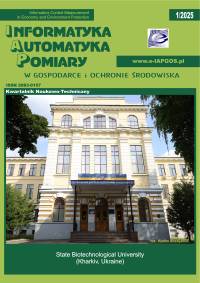CYFROWE PODEJŚCIE DO METODY KONWERSJI NATĘŻENIA PRĄDU TERMOEMISJI ELEKTRONOWEJ NA NAPIĘCIE DLA WYSOKONAPIĘCIOWYCH ŹRÓDEŁ ELEKTRONÓW
Abstrakt
Prąd termoemisji elektronowej jest wykorzystywany w wielu przyrządach próżniowych takich jak ewaporatory, ekscymery gazów rzadkich czy w fizyce wysokich energii. Stabilność natężenia prądu termoemisji elektronowej jest ważnym wymaganiem w kontekście dokładności tych przyrządów. Istnieje wiele układów regulacji natężenia prądu termoemisji elektronowej, które używają sygnału sprzężenia zwrotnego wprost proporcjonalnego do natężenia prądu termoemisji elektronowej w celu jego stabilizacji. Większość z nich wykorzystuje sprzężenie od wysokonapięciowego obwodu anody do niskonapięciowego obwodu katody. Istnieje nowe rozwiązanie, które wykorzystuje liniowy rozkład prądu katody oraz przetwarzanie dwóch sygnałów z obwodu katody w celu konwersji natężenia prądu termoemisji na napięcie. Niestety metoda ta bazuje na przestarzałej technologii analogowej. W niniejszej pracy pokazana została konwersja natężenia prądu termoemisji elektronowej na napięcie z użyciem cyfrowego układu automatycznej regulacji. Cyfrowa realizacja algorytmu multiplikatywno-addytywnego została zaprezentowana, a poprawna praca w zamkniętej pętli sprzężenia zwrotnego potwierdzona.
Słowa kluczowe:
emisja elektronów, źródła elektronów, synteza systemu sterowania, sterowanie cyfroweBibliografia
Ahn J. et al.: Microprocessor‐controlled Electron Impact Ion Source Operated at Constant Discharge Current and Voltage. Review of Scientific Instruments 57(3), 1986, 325–328 [http://doi.org/10.1063/1.1138939].
DOI: https://doi.org/10.1063/1.1138939
Google Scholar
Angiolillo P.: On Thermionic Emission and the Use of Vacuum Tubes in the Advanced Physics Laboratory. American Journal of Physics - Amer J Phys 77, 2009, 1102–1106 [http://doi.org/10.1119/1.3212463].
DOI: https://doi.org/10.1119/1.3212463
Google Scholar
Barcellan L. et al.: A Battery-Operated, Stabilized, High-Energy Pulsed Electron Gun for the Production of Rare Gas Excimers. Review of Scientific Instruments 82(8), 2011, 095103 [http://doi.org/10.1063/1.3636078].
DOI: https://doi.org/10.1063/1.3636078
Google Scholar
Chapman R.: Versatile Wide Range Electron Current Regulator. Review of Scientific Instruments 43(10), 1972, 1536–1538 [http://doi.org/10.1063/1.1685484].
DOI: https://doi.org/10.1063/1.1685484
Google Scholar
Close K. J., Yarwood J.: A Precision Electron Emission Regulator. Vacuum 22(2), 1972, 45–46 [http://doi.org/10.1016/0042-207X(72)90001-2].
DOI: https://doi.org/10.1016/0042-207X(72)90001-2
Google Scholar
DAQ M Series Manual. National Instruments, 2016.
Google Scholar
Donkov N., Knapp W.: Control of Hot-Filament Ionization Gauge Emission Current: Mathematical Model and Model-Based Controller. Measurement Science and Technology 8(7), 1997, 798–803 [http://doi.org/10.1088/0957-0233/8/7/016].
DOI: https://doi.org/10.1088/0957-0233/8/7/016
Google Scholar
Durakiewicz T.: Electron Emission Controller with Pulsed Heating of Filament. International Journal of Mass Spectrometry and Ion Processes 156(1), 1996, 31–40 [http://doi.org/10.1016/S0168-1176(96)04417-5].
DOI: https://doi.org/10.1016/S0168-1176(96)04417-5
Google Scholar
Flaxer E.: Programmable Smart Electron Emission Controller for Hot Filament. Review of Scientific Instruments 82(2), 2011, 025111 [http://doi.org/10.1063/1.3555340].
DOI: https://doi.org/10.1063/1.3555340
Google Scholar
Foil Resistors VPR220 & VPR221. Vishay Precision Group, 2014, http://www.vishaypg.com/foil-resistors/list/product-63012/
Google Scholar
Halas S., Sikora J.: Electron Emission Stabiliser with Double Negative Feedback Loop. Measurement Science and Technology 1(9), 1990, 980–982 [http://doi.org/10.1088/0957-0233/1/9/023].
DOI: https://doi.org/10.1088/0957-0233/1/9/023
Google Scholar
Herbert B. K.: A Circuit for Stabilizing the Electron Current to the Anode of a Hot-Filament Device. Vacuum 26(9), 1976, 363–369 [http://doi.org/10.1016/S0042-207X(76)80225-4].
DOI: https://doi.org/10.1016/S0042-207X(76)80225-4
Google Scholar
Kania B., Sikora J.: System Identification of a Hot Cathode Electron Source: Time Domain Approach. AIP Advances 8(10), 2018, 105107 [http://doi.org/10.1063/1.5044258].
DOI: https://doi.org/10.1063/1.5044258
Google Scholar
Kania B., Sikora J.: Thermionic emission controller with PID algorithm. 23rd International Conference “Mixed Design of Integrated Circuits and Systems” MIXDES 2016, 480–83 [http://doi.org/10.1109/MIXDES.2016.7529790].
DOI: https://doi.org/10.1109/MIXDES.2016.7529790
Google Scholar
Kuś D. et al.: Conversion Method of Thermionic Emission Current to Voltage for High-Voltage Sources of Electrons. Electronics 10(22), 2021, 2844 [http://doi.org/10.3390/electronics10222844].
DOI: https://doi.org/10.3390/electronics10222844
Google Scholar
Lin X. W. et al.: A Miniature Electron‐beam Evaporator for an Ultrahigh‐vacuum Atom‐probe Field‐ion Microscope. Review of Scientific Instruments 61(12), 1990, 3745–3749 [http://doi.org/10.1063/1.1141547].
DOI: https://doi.org/10.1063/1.1141547
Google Scholar
Meyer zu Heringdorf F. J., Belton A.C.: Flexible Microprocessor-Based Evaporation Controller. Review of Scientific Instruments 75(12), 2004, 5288–5292 [http://doi.org/10.1063/1.1818911].
DOI: https://doi.org/10.1063/1.1818911
Google Scholar
Oberai A., Jiann-Shiun Y.: Smart E-Beam for Defect Identification & Analysis in the Nanoscale Technology Nodes: Technical Perspectives. Electronics 6(4), 2017, 87 [http://doi.org/10.3390/electronics6040087].
DOI: https://doi.org/10.3390/electronics6040087
Google Scholar
Pepitone K. et al.: Operation of a High-Current Drive Beam Electron Gun Prototype for the Compact Linear Collider. Review of Scientific Instruments 91(9), 2020, 093302 [http://doi.org/10.1063/5.0013144].
DOI: https://doi.org/10.1063/5.0013144
Google Scholar
Shaw S. Y., Juh T. L.: An Integrated Circuit Based Vacuum Ionisation Gauge Meter. Journal of Physics E: Scientific Instruments 13(11), 1980, 1150–1153 [http://doi.org/10.1088/0022-3735/13/11/003].
DOI: https://doi.org/10.1088/0022-3735/13/11/003
Google Scholar
Sikora J.: Dual Application of a Biasing System to an Electron Source with a Hot Cathode. Measurement Science and Technology 15(1), 2003, N10–14 [http://doi.org/10.1088/0957-0233/15/1/N03].
DOI: https://doi.org/10.1088/0957-0233/15/1/N03
Google Scholar
Sikora J. et al.: Thermionic Electron Beam Current and Accelerating Voltage Controller for Gas Ion Sources. Sensors 21(8), 2021, 2878 [http://doi.org/10.3390/s21082878].
DOI: https://doi.org/10.3390/s21082878
Google Scholar
Siwek M., Edgecock T.: Application of Electron Beam Water Radiolysis for Sewage Sludge Treatment, a Review. Env. Science and Pollution Research 27(34), 2020, 42424–42448 [http://doi.org/10.1007/s11356-020-10643-0].
DOI: https://doi.org/10.1007/s11356-020-10643-0
Google Scholar
Stevie F. A., Carrie L. D.: Introduction to X-Ray Photoelectron Spectroscopy. Journal of Vacuum Science & Technology A 38(6), 2020, 063204 [http://doi.org/10.1116/6.0000412].
DOI: https://doi.org/10.1116/6.0000412
Google Scholar
Zimek Z.: Wytyczne do budowy radiacyjnej instalacji obróbki wód balastowych przy użyciu wiązki elektronów. Raporty IChTJ. Seria B nr 2/2020.
Google Scholar
Autorzy
Bartosz Kaniab.kania@pollub.pl
Politechnika Lubelska Polska
http://orcid.org/0000-0001-8429-6360
Statystyki
Abstract views: 126PDF downloads: 184
Licencja

Utwór dostępny jest na licencji Creative Commons Uznanie autorstwa – Na tych samych warunkach 4.0 Miedzynarodowe.
Inne teksty tego samego autora
- Bartosz Kania, SYMULATOR ŹRÓDŁA ELEKTRONÓW Z GORĄCĄ KATODĄ , Informatyka, Automatyka, Pomiary w Gospodarce i Ochronie Środowiska: Tom 7 Nr 2 (2017)
- Bartosz Kania, Jarosław Sikora, UKŁADY AUTOMATYCZNEJ REGULACJI PRĄDU TERMOEMISJI ELEKTRONOWEJ W PRÓŻNIOWYCH PRZYRZĄDACH POMIAROWYCH , Informatyka, Automatyka, Pomiary w Gospodarce i Ochronie Środowiska: Tom 4 Nr 3 (2014)









